新标准英语第三册教案
新标准大学英语book3-unit4教案
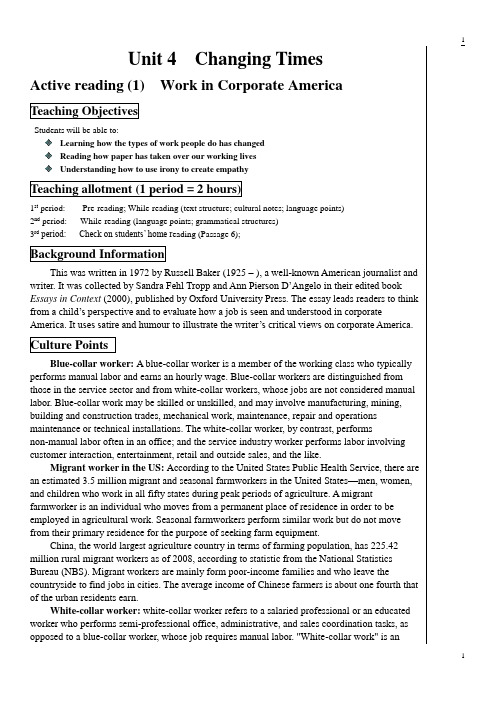
Unit 4 Changing TimesActive reading (1) Work in Corporate AmericaTeaching ObjectivesStudents will be able to:Learning how the types of work people do has changedReading how paper has taken over our working livesUnderstanding how to use irony to create empathyTeaching allotment (1 period = 2 hours)1st period: Pre-reading; While-reading (text structure; cultural notes; language points)2nd period: While-reading (language points; grammatical structures)3rd period: Check on students’ home r eading (Passage 6);Background InformationThis was written in 1972 by Russell Baker (1925 – ), a well-known American journalist and writer. It was collected by Sandra Fehl Tropp and Ann Pierson D’Angelo in their edited book Essays in Context (2000), published by Oxford University Press. The essay leads readers to think from a child’s perspective and to evaluate how a job is seen and understood in corporate America. It uses satire and humour to illustrate the writer’s critical views on corporate America. Culture PointsBlue-collar worker: A blue-collar worker is a member of the working class who typically performs manual labor and earns an hourly wage. Blue-collar workers are distinguished from those in the service sector and from white-collar workers, whose jobs are not considered manual labor. Blue-collar work may be skilled or unskilled, and may involve manufacturing, mining, building and construction trades, mechanical work, maintenance, repair and operations maintenance or technical installations. The white-collar worker, by contrast, performsnon-manual labor often in an office; and the service industry worker performs labor involving customer interaction, entertainment, retail and outside sales, and the like.Migrant worker in the US: According to the United States Public Health Service, there are an estimated 3.5 million migrant and seasonal farmworkers in the United States—men, women, and children who work in all fifty states during peak periods of agriculture. A migrant farmworker is an individual who moves from a permanent place of residence in order to be employed in agricultural work. Seasonal farmworkers perform similar work but do not move from their primary residence for the purpose of seeking farm equipment.China, the world largest agriculture country in terms of farming population, has 225.42 million rural migrant workers as of 2008, according to statistic from the National Statistics Bureau (NBS). Migrant workers are mainly form poor-income families and who leave the countryside to find jobs in cities. The average income of Chinese farmers is about one fourth that of the urban residents earn.White-collar worker: white-collar worker refers to a salaried professional or an educated worker who performs semi-professional office, administrative, and sales coordination tasks, as opposed to a blue-collar worker, whose job requires manual labor. "White-collar work" is aninformal term, defined in contrast to "blue-collar work".Home office: A home office is a space within an individual's personal residence that is used for business purposes. It may be a corner of a spare bedroom equipped with nothing more than a desk. Or, it could be one whole floor of a house filled with the latest in computer and communications devices. Whatever its size and composition, however, the home office is increasingly common in American business today. A majority of the estimated 40 million Americans who work from their homes are self-employed small business owners.In addition, many professionals maintain two offices, and a growing number are equipping their home computers with modems that allow them access to their office computer files. Many large corporations are also expanding experiments in "telecommuting," which enables employees to work from home, using modem-equipped computers, just as they would in the office.1. Where are these people?They are in a large office.2. What are the people doing?They are working with their computers.3. Why does the man standing compare Americans with Japanese?The Japanese have always been considered the most industrious and tireless in the world.4. Are those sitting there excited about being Number One?They do not seem to be very excited.5. What do you think the man sitting back mean?It seems that he is not in agreement with the man standing. Working longer doesn’t necessarily lead to a great country.6. Do you think they are doing something really necessary and important?I don’t think so.In today’s American jobs are not what the y used to be. Not long ago, when a father was asked about his job he could answer in terms that a child could come to grips with. Nowadays, when the parent take his offspring to his place of business in glass buildings that are really incomprehensive to c hildren. What’s more, it’s safe bet that even grown men have trouble visualizing what other men does in their jobs with his day. Therefore, it’s not difficult to imagine a poor child may answer “mulling over” after it beat’s me. the mysteries of work, when his friend asks him of his father’s job.Part A. Key words and expressions:corporate a. relating to large companies, or to a particular large company 大公司的e.g.1. They are going to reorganize the corporate structure next year.他们明年要改组公司。
新标准大学英语3_教案
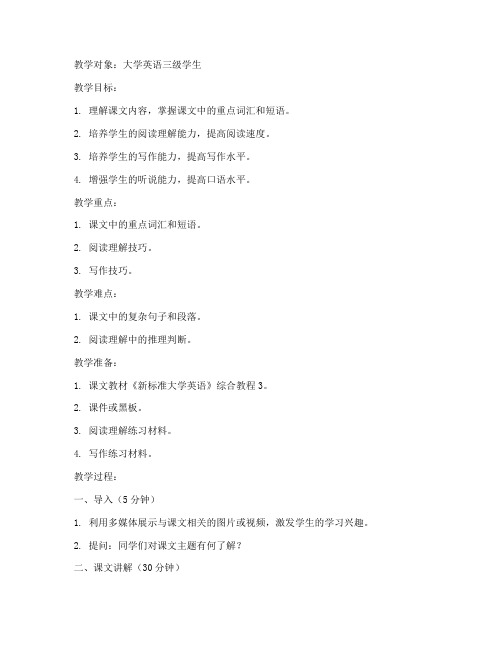
教学对象:大学英语三级学生教学目标:1. 理解课文内容,掌握课文中的重点词汇和短语。
2. 培养学生的阅读理解能力,提高阅读速度。
3. 培养学生的写作能力,提高写作水平。
4. 增强学生的听说能力,提高口语水平。
教学重点:1. 课文中的重点词汇和短语。
2. 阅读理解技巧。
3. 写作技巧。
教学难点:1. 课文中的复杂句子和段落。
2. 阅读理解中的推理判断。
教学准备:1. 课文教材《新标准大学英语》综合教程3。
2. 课件或黑板。
3. 阅读理解练习材料。
4. 写作练习材料。
教学过程:一、导入(5分钟)1. 利用多媒体展示与课文相关的图片或视频,激发学生的学习兴趣。
2. 提问:同学们对课文主题有何了解?二、课文讲解(30分钟)1. 介绍课文背景和作者。
2. 逐段讲解课文,讲解过程中注重词汇和短语的学习。
3. 分析课文中的复杂句子和段落,帮助学生理解。
三、阅读理解(20分钟)1. 分组讨论课文内容,让学生在讨论中提高阅读理解能力。
2. 进行阅读理解练习,讲解答案,引导学生掌握阅读理解技巧。
四、写作训练(20分钟)1. 提供写作话题,让学生根据话题进行写作。
2. 讲解写作技巧,指导学生如何提高写作水平。
五、课堂小结(5分钟)1. 总结本节课所学内容,强调重点和难点。
2. 提醒学生课后复习课文,巩固所学知识。
六、课后作业1. 复习课文,掌握课文中的重点词汇和短语。
2. 完成阅读理解练习,提高阅读理解能力。
3. 根据写作话题,撰写一篇短文。
教学反思:本节课通过导入、课文讲解、阅读理解、写作训练等环节,使学生在轻松愉快的氛围中掌握了课文内容,提高了阅读理解能力和写作水平。
在今后的教学中,我将注重以下几点:1. 关注学生的个体差异,因材施教。
2. 加强课堂互动,提高学生的参与度。
3. 注重培养学生的自主学习能力,提高学生的综合素质。
新编英语教程第三册unit1教案资料
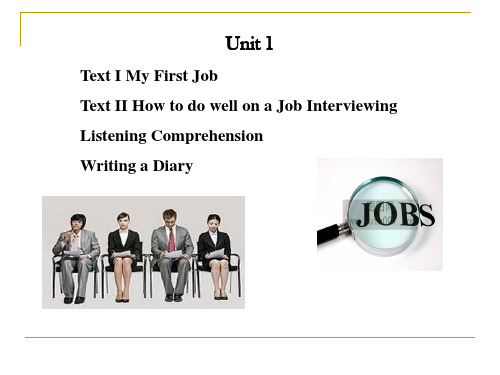
Step 1 Listening In and Speaking out !
1 Prepare for the new words 2 Listen and try to understand
1. When you receive a job offer, what issues must you consider before making a decision?
Unit 1
Text I My First Job Text II How to do well on a Job Interviewing Listening Comprehension Writing a Diary
suburb, summon, awkward, dreary, gabled, ever-green, fume, an air of, disapproval, colonel, grunt, dingy, proceed, margarine, mumble, attach importance to, consist of, appall, split, dismayed, diffidently, protest, get to one’s feet, last straw, prospect
- Arnold Toynbee
Choose a job you love, and you will never have to
work a day in your life. - Confucius
好之者不如乐之者。——出自《论语·雍也》
3. Speaking out
What kind of job do you think is an ideal job for you?
新编英语教程(第三版)第3册电子教案
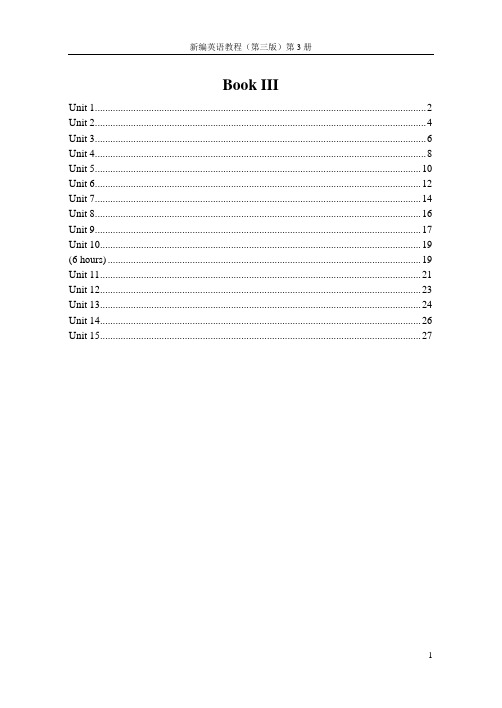
Book IIIUnit 1 (2)Unit 2 (4)Unit 3 (6)Unit 4 (8)Unit 5 (10)Unit 6 (12)Unit 7 (14)Unit 8 (16)Unit 9 (17)Unit 10 (19)(6 hours) (19)Unit 11 (21)Unit 12 (23)Unit 13 (24)Unit 14 (26)Unit 15 (27)Unit 1(6 hours)I. Teaching Aims:In this unit students are required to:1.Practice reading strategies such as predicting, skimming, guessing, etc.2.Grasp some new words and expressions to enrich student’s vocabulary;3.Do some oral work such as pre-reading questions, role play and interactionactivities to h elp to develop the students’ oral communicative abilities;4.Appreciate the two narrations in this unit and learn some writing skills in narrationand practice it along with letter writing;5.Do some other after-class exercise including listening and translation to improvestudents’ comprehensive skills.II. Teaching Emphasis:1. The comprehension and appreciation of Text I;2. New words and expressions:Awkward; dreary; rotund; grunt; proceed; dismay; appall; diffidently; singularly;reckon; querulous; somber; scribble; attach importance to; have sth. in common; a crocodile ofIII. Teaching Procedures: (4 hours)1.Greeting;2.The whole plan for this semester;3.Begin the new lesson:1). Answer the pre-reading questions orally;2).Allow students 3 minutes to go over text I rapidly for the main idea;3). Do the guesswork of vocabulary;4). Study Text I intensively;5). Answer the questions of Text I both in SB (student’s book) and B(workbook)orally;6). Listen to the tape and study Text II extensively to enlarge their vocabulary andwiden the scope of their knowledge;7). Do oral work;8).Study the main points of guided writing, including theinformation about précis writing, paragraph writing of narration and description, and the heading and salutation of a letter;9). Homework, finish all the exercise both in SB and WB.IV. Language points for Text I1…. With no experience of teaching my chances of landing the job were slim: there is little possibility for me to get the jobchances of doing sth.land: succeed in getting sth.E.g. His chance/chances of landing the1st prize is/are slim/scant/slender/small.2. summon sb. to do sth.3. …smell unpleasantly of stale cabbagesmell of: give out the smell of scent ofE.g. smell of brandy/paint/garlicHis accounts seemed to me smell of truth.4. proceed to (do) sth.: go ahead, continue to doprecede: come, go or happen just before sth. precede sth (with sth)E.g. proceed to announce his plan;proceed to the next item on the agenda;He preceded his speech with a warning against inattention.5. attach importance to sth.; consider… importantE.g. attach much importance/weight/significance to the theory6. have sth. in common7. not so much…but the fact that…E.g. It was not so much there being no councils of workers, peasants and soldiersworthy of the mane, but the fact that they were very few.8. the last straw: an addition to a set of troubles which makes one unbearableE.g. The hotel was expensive, the food poor, and bad weather was the last straw. V. Language points for Text II1.prompt sb. to do sth or prompt sth: urge or causeE.g. His action was prompted by fear.Hunger prompted him to steal.2. Feeling anything but well.: feeling far from being wellanything but (恰恰不,才不) nothing/nobody but (正是,只是)all but(几乎,差一点)E.g. She looks anything but well. ( She looks ill.)You have nobody but yourself to blame.The thief has all but succeeded in escaping.3. be set on/upon (doing) sth: be determined to do, make up one’s mind4. get round to doing sth.: find time to do sth. at lastE.g. After a long delay, he got around to writing the letter.5. instill sth. in/into sbinstill: to put (ideas feelings, etc.) gradually but firmly into someone’s mind by a continuous effortE.g. instill the idea of discipline and obedience into new soldiers6. It was more a cross-examination than an interview.7. In due course, you will hear from us.Due: right and properE.g. He has his due reward.Unit 2(6 hours)I. Teaching Aims:In this unit students are required to:1.Practice reading strategies such as predicting, skimming, guessing, etc.2.Grasp some new words and expressions to enrich student’s vocabulary;3.Do some oral work such as pre-reading questions, role play and interactionactivities to help to develop the students’ oral communicative abilities;4.Appreciate and learn some writing skills in the description of Text I and practice italong with letter writing;5.Get to know some information about April Fool’s Day;6.Do some other after-class exercise including listening and translation to improvestudents’ comprehensive skills.II. Teaching Emphasis:1. The comprehension and appreciation of Text I;2. New words and expressions:weep, rage, accordingly, croaking, cling, dismissive, brutal, quarantine, coop, witty, exempt, hoax, growl, preyIII. Teaching Procedures: (4 hours)1.Review the main points in last class;2.Study the new unit:1)Answer the pre-reading questions orally;2)Allow students 4 minutes to go over text I rapidly for the main idea;3)Do the guesswork of vocabulary;4)Study Text I intensively;5)Answer the questions of Text I both in SB(student’s book) andWB(workbook) orally;6)Listen to the tape and study Text II extensively to enlarge their vocabularyand widen the scope of their knowledge;7)Do oral work;8)Study the main points of guided writing, including how to write a paragraphof description, and the introduction of a letter;9)Homework, finish all the exercise both in SB and WB.IV. Language points for Text I1.He looked his goodbye at the garden.: He said his goodbye by looking at thegarden.2.cling toE.g. She still clings to the belief that her husband is alive.Little babies usually cling to their mothers.3.prepare sb/oneself for sth : make someone/oneself ready to accept or to beadjusted to a new condition, idea, or an event4.at such short notice: with little time for preparationE.g. The students usually give the landlady one month’s notice before they move.One can always get a taxi here at a short notice/at a moment’s notice.5.If only: is often used to introduce an exclamation expressing an unfulfilledcondition at present, in the past or in the future. The verb is generally in the past or past perfect.E.g. If only I had a chance to live my childhood once again.If only he had had a lot in common with me.6.would rather do sth than do sthE.g. I’d rather walk all these stairs up than wait for the lift to go up.7.be cooped upE.g. he felt good in the fresh air after being cooped up in the house for so long. V. Language points for Text II1.hoax: deceive, play tricks on sbhoax sb with sth, hoax sb into doing sthcoax: get sb to do sth by kindness or patiencecoax sb to do sth, coax sb into/out of doing sth2.needless to say3.prey: an animal that is hunted and eaten by another animal or by a person;someone who can easily be deceived or influencedE.g. Some salesman consider young housewives easy prey.4.exempt: free from a duty or service exempt…fromE.g. A doctor’s note will exempt you from physical education.VI. Some information about April Fool’s DayApril Fool’s Day is on April 1st. It is traditionally a day to play practical jokes on others, send people on fool's errands, and fool the unsuspecting. No one knows how this holiday began but it was thought to have originated in France.The closest point in time that can be identified as the beginning of this tradition was in 1582, in France. New Year's was celebrated on March 25 and celebrations lasted until April 1st. When New Year's Day was changed from March 25 to January 1st in the mid-1560's by King Charles IX, there were some people who still celebrated it on April 1st and those people were called April Fools.Pranks performed on April Fool's Day range from the simple, (such as saying, "Your shoe's untied!), to the elaborate. Setting a roommate's alarm clock back an hour is a common gag. The news media even gets involved. For instance, a British short film once shown on April Fool's Day was a fairly detailed documentary about "spaghetti farmers" and how they harvest their crop from the spaghetti trees.Whatever the prank, the trickster usually ends it by yelling to his victim, "April Fool!"April Fool's Day is a "for-fun-only" observance. Nobody is expected to buy gifts or to take their "significant other" out to eat in a fancy restaurant. Nobody gets off work or school. It's simply a fun little holiday, but a holiday on which one must remain forever vigilant, for he may be the next April Fool!Each country celebrates April Fool's differently. In France, the April Fool's is called "April Fish" (Poisson d'Avril). The French fool their friends by taping a paper fish to their friends' backs and when some discovers a this trick, they yell "Poisson d'Avril!". In England, tricks can be played only in the morning. If a trick is played on you, you are a "noodle". In Scotland, April Fools Day is 48 hours long and you are called an "April Gowk", which is another name for a cuckoo bird. The second day in Scotland's April Fool's is called Taily Day and is dedicated to pranks involving the buttocks. Taily Day's gift to posterior posterity is the still-hilarious "Kick Me" sign.Unit 3(6 hours)I. Teaching Aims:In this unit students are required to:1.Practice reading strategies such as predicting, skimming, guessing, etc.2.Grasp some new words and expressions to enrich student’s vocabulary;3.Do some oral work such as pre-reading questions, role play and interactionactivities to help to develop the students’ oral communicative abilities;4.Appreciate and learn some writing skills in the narration of Text I and practice italong with letter writing;5.Get to know some information about Bermuda Triangle;6.Do some other after-class exercise including listening and translation to improvestudents’ comprehensive s kills.II. Teaching Emphasis:1. The comprehension and appreciation of Text I;2. New words and expressions:consent, bid goodbye to, coincidence, feebly, naval, terminal, clarification, incredible, inheritance, wreckage, literally, snatch, overdueIII. Teaching Procedures: (4 hours)1. Review the main points in last class;2. Study the new unit:1)Do the pre-reading questions;2)Allow students 5 minutes to read the text rapidly for the main idea;3)Do the guesswork of vocabulary;4)Study Text I intensively;5)Answe r the questions of Text I both in SB(student’s book) and WB(workbook)orally;6)Listen to the tape and study Text II extensively to enlarge their vocabulary andwiden the scope of their knowledge;7)Do oral work;8)Study the main points of guided writing, including narration in chronologicalorder, and purpose of a letter;9)Homework, finish all the exercise both in SB and WB.IV. Language points for Text I1.consent: agreement or permission (v. n.)consent to sth.E.g. The young couple won/obtain/had their parent s’consent to theirmarriage.Shakespeare is, by common consent(公认), the greatest Englishdramatist.Her father reluctantly consented to the marriage.2.bid goodbye to sb.3.make some/a/no differenceE.g. A little perseverance makes a big difference between failure and success.It doesn’t make any difference to me which side will win or lose.4.find one’s voice5.purple with angergreen with envyash-white with terror6.My watch gains/loses a minute every day.V. Language points for Text II1.refer to sth as sth2.literally: really, without exaggeration; word for word, strictlyE.g. The children were literally starving.translate literally; carry out orders too literally3.vanish into thin air: disappear completely4.contribute to: help to cause sthE.g. Plenty of fresh air contributes to good health.Unit 4(6 hours)I. Teaching Aims:In this unit students are required to:1.Practice reading strategies such as predicting, skimming, guessing, etc.2.Grasp some new words and expressions to enrich student’s vocabulary;3.Do some oral work such as pre-reading questions, role play and interactionactivities to help to develop the students’ oral communicative abilities;4.Learn some writing skills in narration and letter writing;5.Get to know more information about William Shakespeare;6.Do some other after-class exercise including listening and translation toimprove students’ comprehensive skills.II. Teaching Emphasis:1. The comprehension and appreciation of Text I;2. New words and expressions:legacy, estate, genius, baptize, in a flash, influential, sufficiently, conviction, apprentice, set foot on the road to, presume, tempest, brilliantIII. Teaching Procedures: (4 hours)1. Review the main points in last class;2. Study the new unit:1) Answer the pre-reading questions orally;2) Allow students 4 minutes for rapid reading and 10 minutes for writing down themain idea for each paragraph;3)Do the guesswork of vocabulary;4)Study Text I intensively;5)Answer the questions of Text I both in SB(student’s book) and WB(workbook) orally;6)Listen to the tape and study Text II extensively to enlarge their vocabulary and widen the scope of their knowledge;7)Do oral work;8)Study the main points of guided writing, including the narration in chronological order and conclusion and ending of a letter;9)Homework, finish all the exercise both in SB and WB.IV. Language points for Text I1. be comfortably/well /better/best/badly/worse/worst off2. amount to: add up to, reach; be equal in meaning, be the same asE.g. Our monthly expenditure on food usually amounts to 150 yuan.Her reply amounts refusal.You won’t amount to anything if you idle your time away like this.3.literary: typical of literatureE.g. literary works; literary styleliteral: being or following the exact or original meaning of a wordE.g. literal meaning ←→figurative meaningliteral translation ←→free translationliterate: able to read and write4.conviction: the feeling of being sure about sthE.g. It’s my conviction that our team will win the game.convict: declare sb is guiltyconvict sb. of sth5.realize in a flashV. Language points for Text II1.be apprenticed to2.set foot on the road to sthVI. More Information on William ShakespeareOne of the greatest giants of the Renaissance, Shakespeare holds, by general acclamation, the foremost place in the worl d’s literature. His close friend, the playwright Ben Johnson, said of him that he was “not of an age, but for all time.”His works are a great landmark in the history of world literature for he was one ofthe first founders of realism, a master hand at realistic portrayal of human characters and relations.Shakespeare’s complete works include 37 plays, 2 narrative poems and 154 sonnets. Some of his best known plays are:The Taming of the ShrewRomeo and Juliet,A Midsummer Night’s DreamThe Merchant of VeniceMuch Ado about Nothing,Twelfth NightAll’s Well that Ends Well, HamletOthelloKing LearMacbethTimon of AthensMeasure for MeasureThe TempestUnit 5(6 hours)I. Teaching Aims:In this unit students are required to:1.Practice reading strategies such as predicting, skimming, guessing, etc.2.Grasp some new words and expressions to enrich student’s vocabulary;3.Do some oral work such as pre-reading questions, role play and interactionactivities to help to develop the students’ oral communica tive abilities;4.Get to know the organization of a feature report and learn some writing skills innarration and practice it along with letter writing;5.Do some other after-class exercise including listening and translation to improvestudents’ comprehensive skills.II. Teaching Emphasis:1. The comprehension and appreciation of Text I;2. New words and expressions:lobby, complexion, foreboding, shudder, scheme, psyche, moat, breach, in progress, screech, quirk, chic, grunge, reverie, scramble, lopsided, executive, distressing, badger, have the nerve to do sthIII. Teaching Procedures: (4 hours)1. Review the main points in last class;2. Study the new unit:1) Read the information of the text on p.54, 55 to get a better understanding ofChunnel;2) Answer the pre-reading questions orally;3) allow students 5 minutes to read the text rapidly for the main idea;4) do the guesswork of vocabulary;5) Study Text I intensively;6) Answer the questions of Text I both in SB(student’s book) and WB(work book)orally;7) Listen to the tape and study Text II extensively to enlarge their vocabulary andwiden the scope of their knowledge;8) do oral work;9) Study the main points of guided writing, mainly paragraph writing ofnarration in informal tone, and letter writing to ask for information;10) Homework, finish all the exercise both in SB and WB.IV. Language points for Text I1.…stiff upper lips trembled: here stiff upper lips stands for Englishman. It’smetonymy.(换喻,转喻)(keep) a stiff upper lip: (show) an ability to appear calm and unworried whenin pain or troubleE.g. The general praised the boys for keeping a stiff upper lip in time oftrouble.2. A tiny explosion of air from pursed lips.purse up one’s lips: draw one’s lips together esp. as a sign o f disapproval3.by the grace of God: due to, thanks toE.g. By the grace of God the children were rescued by the fireman.pound adjectives made up in various ways:the soon-to-be-opened Chunnelthe gull-wing eyebrowscross-Channel-link schemestungsten-tipped teethV. Language points for Text II1.alternative: adj. OtherE.g. Have you got an alternative suggestion?n. choice of twoE.g. Caught in the act, he had no alternative but to confess.alternate: adj. A. (of two things) happening or following one after the otherE.g. alternate triumph and despairB. every second e.g. on alternate daysv. cause to occur one after the otherE.g. Most farmers alternate their crops.2.It’s a matter of choice, not nerves.nerve: couragehave the/no nerve to do sth or lose one’s nerveUnit 6(6 hours)I. Teaching Aims:In this unit students are required to:1.Practice reading strategies such as predicting, skimming, guessing, etc.2.Grasp some new words and expressions to enrich student’s vocabulary;3.Do some oral work such as pre-reading questions, role play and interactionactivities to help to develop the students’ oral communicative abilities;4.Appreciate the two arguments in this unit and learn some writing skills andpractice it along with letter writing;5.Do some other after-class exercise including listening and translation to improvestudents’ comprehensive skills.II. Teaching Emphasis:1. The comprehension and appreciation of Text I;2. New words and expressions:refuel, outlay, harness, bonnet, conquer, radiation, penetrate, synthetic, extinction, rivet, in a panic, opposition, scrap, evacuation, arsenal, scornIII. Teaching Procedures: (4 hours)1. Review the main points in last class;2. Study the new unit:1)Answer the pre-reading questions orally;2)Allow students 3 minutes to read the text rapidly for the main idea;3)Do the guesswork of vocabulary;4)Study Text I intensively;5)Answer the questions of Text I both in SB(student’s book) and WB(workbook)orally;6)Listen to the tape and study Text II extensively to enlarge their vocabulary andwiden the scope of their knowledge;7)Do oral work;8)Study the main points of guided writing, mainly about the paragraph writing ofargument, and the letter writing to ask a favor;9)Homework, finish all the exercise both in SB and WB.IV. Language points for Text I1.dream of sth or doing sth2.Harness atomic power in a car, and you’ll have no more worries about petrol.╱or you’ll do…= If …not…you’ll…Imperative sentence,╲and you’ll do…= If … you’ll…E.g. Practice speaking English more, and you’ll improve your oral Englishquickly.Be careful in your pronunciation, or you’ll have great trouble in listeningand speaking.3.outlay: a spending of moneyoutlay on sth.E.g. the weekly outlay on groceries;a considerable outlay on basic researchOur country has outlaid (v.) a large sum of money in capital construction.4.economy: A. economic situation B. thrift and frugalityE.g. The economy of the country is changing from bad to worse.We are better off now, but we still have to practice economy.economic: having to do with economicsE.g. Economic crises are sure to occur in the capitalist world from time to time.economical: thrifty, not wasting money or timeE.g. The writer is famous for his economical style.5.be well on the way toE.g. We were well on the way to the age of knowledge-based economy.V. Language points for Text II1.pour scorn on sb/sthhold /think it scorn to do sthy out: displayE.g. lay out merchandise3.in a panicUnit 7(6 hours)I. Teaching Aims:In this unit students are required to:1.Practice reading strategies such as predicting, skimming, guessing, etc.2.Grasp some new words and expressions to enrich student’s vocabulary;3.Do some oral work such as pre-reading questions, role play and interactionactivities to help to develop the students’ oral communicative abilities;4.Appreciate the two arguments in this unit and learn some writing skills andpractice it along with letter writing;5.Do some other after-class exercise including listening and translation to improvestudents’ comprehensive skills.II. Teaching Emphasis:1. The comprehension and appreciation of Text I;2. New words and expressions:pose, suspense, irritate, asphyxiated, ventilate, fidget, indiscreet, chatterbox, elope, obstinacy, willfulness, escapism, justify, tycoon, aptitude, stumble, for a start, turn a deaf ear to, ex-directoryIII. Teaching Procedures: (4 hours)1. Review the main points in last class;2. Study the new unit:1)Answer the pre-reading questions orally;2)Allow students 3.5 minutes to go over the text rapidly for the main idea;3)Do the guesswork of vocabulary;4)Study Text I intensively;5)Answer the questions of Text I both in SB(student’s book) and WB(workbook)orally;6)Listen to the tape and study Text II extensively to enlarge their vocabularyand widen the scope of their knowledge;7)Do oral work;8)Study the main points of guided writing, mainly about the paragraph writingof argument, and the letter writing to make an offer;9) Homework, finish all the exercise both in SB and WB.IV. Language points for Text I1. take sth. for granted or take it for granted that: believe sth. withoutthinking about it very much2. He is proposing to attempt the impossible…: When he intends to do impossible…propose: have formed a plan; intendusage: propose to do sthpropose: suggestusage: propose doing sth./ that clause3.pose as unusual: pretend to beE.g. He posed as a learned man.She is always posing.pose for a photograph with sb.pose an obstacle to the development, allow me to pose a question4.suspense: anxiety or apprehension resulting from an uncertain, undecided ormysterious situationusage: in suspense, keep (sb) in suspense, hold in suspenseE.g. He waited in great suspense for the doctor’s opinion.suspension:E.g. the suspension of arms, suspension from school/officesuspicion:E.g. above suspicion, under suspicion5.justify: give a good reason forjustify sth or doing sthE.g. The editors are perfectly justified in refusing your work.6.have/ show an aptitude for sth.7.be bent on questioning you: be determined to question you.E.g. She is bent on becoming a good pianist.He is bent on making journalism his career.V. Language points for Text II1.for a start: to begin with, to start with2.…get away scot-free: escape without punishmentE.g. No student can get away with a breach of the rules of the university.got away from the restaurant scot-free3.turn a deaf ear to: ignore, pay no attention toE.g. I shall turn a deaf ear in future to all your empty promises.4.the people most plagued by…plague: pester or annoy persistently or incessantlyE.g. Runaway inflation further plagued the wage or salary earner.Unit 8(6 hours)I. Teaching Aims:In this unit students are required to:1.Practice reading strategies such as predicting, skimming, guessing, etc.2.Grasp some new words and expressions to enrich student’s vocabulary;3.Do some oral work such as pre-reading questions, role play and interactionactivities to help to develop the stu dents’ oral communicative abilities;4.Appreciate the two arguments in this unit and learn some writing skills andpractice it along with letter writing;5.Do some other after-class exercise including listening and translation to improvestudents’ comprehensiv e skills.II. Teaching Emphasis:1. The comprehension and appreciation of Text I;2. New words and expressions:shelter, end up with, engross, browsing, retire, indulgent, beckon, tell off, tuck, discreet, poverty-stricken, a nose for, persevere, flickIII. Teaching Procedures: (4 hours)1. Review the main points in last class;2. Study the new unit:1)Answer the pre-reading questions orally;2)Allow students 2 minutes for rapid reading and 5 minutes for writing the mainidea of each paragraph;3)Do the guesswork of vocabulary;4)Study Text I intensively;5)Answer the questions of Text I both in SB(student’s book) and WB(workbook)orally;6)Listen to the tape and study Text II extensively to enlarge their vocabularyand widen the scope of their knowledge;7)Do oral work;8)Study the main points of guided writing, including the paragraph writing ofpersuasive writing, and the letter writing as to make a suggestion;9)Homework, finish all the exercise both in SB and WB.IV. Language points for Text I1.shelter: cover and protectionfind/take shelter from; give shelter to; be a shelter from; under the shelter of2.be engrossed in: be absorbed in, be taken upE.g. The audience was completely engrossed by the actor’s performance.3.to one’s heart’s content: as much as one likeE.g. S he n ever dares to eat to her heart’s content for fear that she would put onweight.4.…the assistant should retire discreetly…retire: move back or awayE.g. retire to one’s room; retire to bed;retire from the service; retire from the world;5.Apart from running up a huge account.run up: make or become greater or largerE.g. run up a huge account/bill/debts6.indulge: yield to, gratifybe indulged inE.g. She is indulged in idle daydreams.7.beckon to sb or beckon sb to do sthE.g. He beckoned me to come nearer.8.tell sb off: scold or rebuke severelyE.g. The teacher told him off for not doing his homework.9. tuff away sth: put sth in a safe placeE.g. The troop was tucked away in a quiet valley.V. Language points for Text II1.be mean with sth2.poverty-stricken; panic-stricken; conscience-stricken; grief-stricken;fever-stricken3.It’s real a bargain.A bargain is a bargain.make a bargain with sb; bargain sth for sth4.has a nose for gossip/informationnose into other’s affairsKeep your big nose out of my affairs.Unit 9(6 hours)I. Teaching Aims:。
新标准英语第三册教案
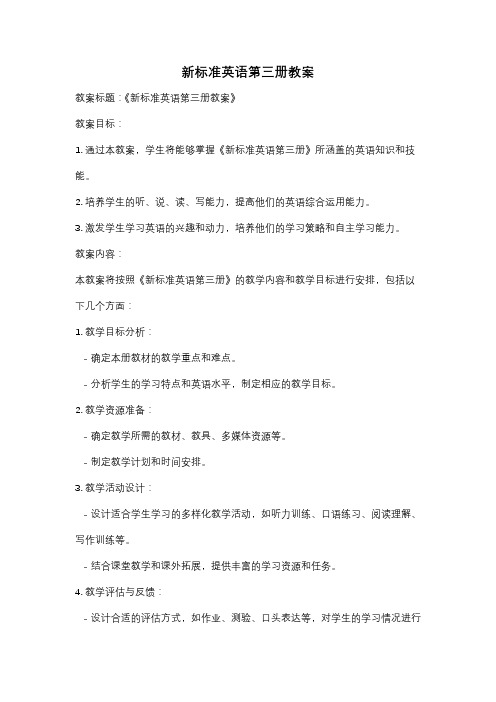
新标准英语第三册教案
教案标题:《新标准英语第三册教案》
教案目标:
1. 通过本教案,学生将能够掌握《新标准英语第三册》所涵盖的英语知识和技能。
2. 培养学生的听、说、读、写能力,提高他们的英语综合运用能力。
3. 激发学生学习英语的兴趣和动力,培养他们的学习策略和自主学习能力。
教案内容:
本教案将按照《新标准英语第三册》的教学内容和教学目标进行安排,包括以下几个方面:
1. 教学目标分析:
- 确定本册教材的教学重点和难点。
- 分析学生的学习特点和英语水平,制定相应的教学目标。
2. 教学资源准备:
- 确定教学所需的教材、教具、多媒体资源等。
- 制定教学计划和时间安排。
3. 教学活动设计:
- 设计适合学生学习的多样化教学活动,如听力训练、口语练习、阅读理解、写作训练等。
- 结合课堂教学和课外拓展,提供丰富的学习资源和任务。
4. 教学评估与反馈:
- 设计合适的评估方式,如作业、测验、口头表达等,对学生的学习情况进行
评估。
- 及时给予学生反馈,帮助他们发现问题、弥补不足。
5. 教学策略和方法:
- 结合学生的学习特点和英语水平,选用适合的教学策略和方法,如任务型教学、合作学习、情景教学等。
- 注重培养学生的学习策略和自主学习能力,激发他们的学习兴趣和动力。
教案评估:
通过教案的实施和评估,可以检验教学目标的达成情况,并对教学过程进行总结和改进。
以上是《新标准英语第三册教案》的大致框架和内容,具体的教案撰写需要根据教材的具体内容和学生的实际情况进行具体设计和安排。
希望对您的教案撰写提供一些指导和建议。
新标准英语第三册
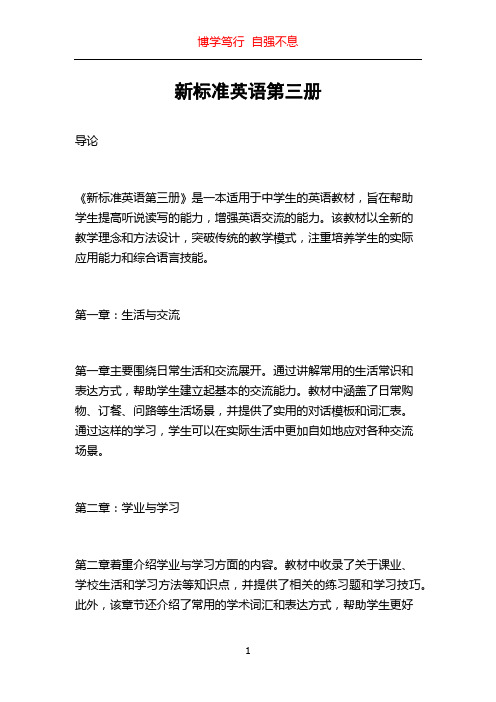
新标准英语第三册导论《新标准英语第三册》是一本适用于中学生的英语教材,旨在帮助学生提高听说读写的能力,增强英语交流的能力。
该教材以全新的教学理念和方法设计,突破传统的教学模式,注重培养学生的实际应用能力和综合语言技能。
第一章:生活与交流第一章主要围绕日常生活和交流展开。
通过讲解常用的生活常识和表达方式,帮助学生建立起基本的交流能力。
教材中涵盖了日常购物、订餐、问路等生活场景,并提供了实用的对话模板和词汇表。
通过这样的学习,学生可以在实际生活中更加自如地应对各种交流场景。
第二章:学业与学习第二章着重介绍学业与学习方面的内容。
教材中收录了关于课业、学校生活和学习方法等知识点,并提供了相关的练习题和学习技巧。
此外,该章节还介绍了常用的学术词汇和表达方式,帮助学生更好地理解和阅读英语学术文献。
通过这一章的学习,学生可以提高自己的学习效率和学术英语能力。
第三章:文化与娱乐第三章主要介绍了英语国家的文化和娱乐活动。
教材中涵盖了音乐、电影、戏剧、体育等多个方面的内容,并提供了相关的阅读材料和练习题。
通过学习这一章,学生可以了解并掌握不同的文化表达方式,拓宽自己的文化视野。
第四章:职场与就业第四章主要围绕职场和就业展开。
教材中介绍了职场用语、求职技巧等内容,并提供了实用的面试对话模板和练习题。
通过学习这一章,学生可以了解职场的基本礼仪和沟通技巧,提高自己在职场中的竞争力。
第五章:社会与环境第五章主要介绍了社会和环境问题。
教材中涵盖了环保、社会问题、公益活动等内容,并提供了相关的阅读材料和写作题目。
通过学习这一章,学生可以了解和探讨一些全球性的社会和环境问题,并学会用英语表达自己的观点和意见。
总结《新标准英语第三册》是一本针对中学生设计的英语教材,以全新的理念和方法提升学生的英语水平和应用能力。
通过生活与交流、学业与学习、文化与娱乐、职场与就业、社会与环境等主题的内容,学生可以全面提升综合语言能力,并且在实际应用中更加自如地运用英语。
小学英语Animals动物优秀教案范例

小学英语Animals动物优秀教案一、教学内容本节课选自小学英语教材《新标准英语》第三册的Chapter 3《Animals》,详细内容包括:认识并掌握与动物相关的词汇,如:panda, tiger, elephant, monkey, lion等;学会使用What's this? It's a 询问和回答动物名称;通过听力练习和口语交流,提高学生对动物单词的识别和运用能力。
二、教学目标1. 让学生掌握本节课的动物词汇,并能正确发音。
2. 培养学生运用所学词汇进行问答交流的能力。
3. 提高学生对动物的认知,培养他们的观察力和想象力。
三、教学难点与重点教学难点:正确掌握动物词汇的发音和拼写。
教学重点:运用What's this? It's a 进行问答交流。
四、教具与学具准备1. 教具:PPT、动物卡片、录音机、磁带。
2. 学具:单词卡片、练习本、彩色笔。
五、教学过程1. 导入:通过PPT展示动物园的场景,引导学生谈论他们在动物园看到的动物,为新课的学习做好铺垫。
过程细节:教师提问,学生回答,共同回忆动物园的动物。
2. 新课展示:教师展示动物卡片,教授新单词,并进行发音示范。
过程细节:教师先展示卡片,让学生猜测动物名称,然后教授新单词,并进行发音示范,学生跟读。
3. 例题讲解:教师通过PPT展示例题,引导学生进行问答交流。
过程细节:教师提问,学生回答,进行角色扮演,巩固所学知识。
4. 随堂练习:学生分组进行单词卡片游戏,巩固所学动物词汇。
过程细节:每组学生轮流抽取卡片,读出动物名称,并进行问答交流。
5. 口语交际:学生分角色扮演,进行动物角色扮演游戏。
过程细节:学生扮演动物,进行问答交流,提高口语表达能力。
过程细节:教师通过提问、回答等方式,帮助学生巩固所学知识。
六、板书设计1. Animals2. 重点单词:panda, tiger, elephant, monkey, lion3. 重点句型:What's this? It's a七、作业设计1. 作业题目:完成课后练习册的相关练习。
湘鲁版小学三年级英语教案7篇
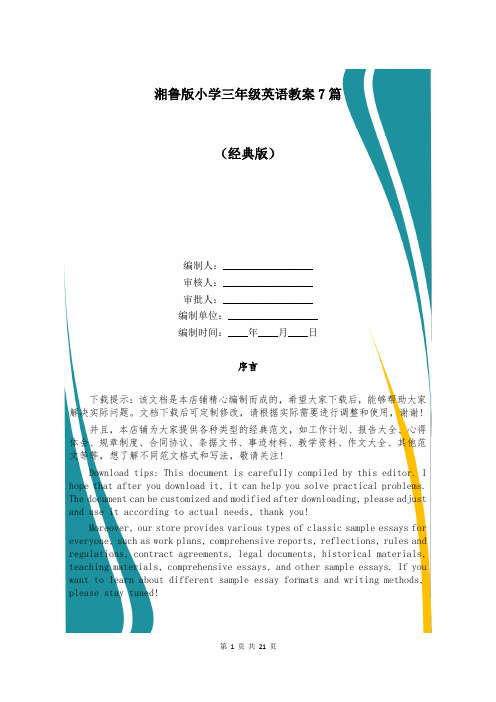
湘鲁版小学三年级英语教案7篇(经典版)编制人:__________________审核人:__________________审批人:__________________编制单位:__________________编制时间:____年____月____日序言下载提示:该文档是本店铺精心编制而成的,希望大家下载后,能够帮助大家解决实际问题。
文档下载后可定制修改,请根据实际需要进行调整和使用,谢谢!并且,本店铺为大家提供各种类型的经典范文,如工作计划、报告大全、心得体会、规章制度、合同协议、条据文书、事迹材料、教学资料、作文大全、其他范文等等,想了解不同范文格式和写法,敬请关注!Download tips: This document is carefully compiled by this editor. I hope that after you download it, it can help you solve practical problems. The document can be customized and modified after downloading, please adjust and use it according to actual needs, thank you!Moreover, our store provides various types of classic sample essays for everyone, such as work plans, comprehensive reports, reflections, rules and regulations, contract agreements, legal documents, historical materials, teaching materials, comprehensive essays, and other sample essays. If you want to learn about different sample essay formats and writing methods, please stay tuned!湘鲁版小学三年级英语教案7篇具有启发性的教案能够激发学生对知识的好奇心和求知欲,详细的教案可以帮助教师制定教学计划,确保教学进度不落后,以下是本店铺精心为您推荐的湘鲁版小学三年级英语教案7篇,供大家参考。
- 1、下载文档前请自行甄别文档内容的完整性,平台不提供额外的编辑、内容补充、找答案等附加服务。
- 2、"仅部分预览"的文档,不可在线预览部分如存在完整性等问题,可反馈申请退款(可完整预览的文档不适用该条件!)。
- 3、如文档侵犯您的权益,请联系客服反馈,我们会尽快为您处理(人工客服工作时间:9:00-18:30)。
设计
1.Warm-up
Play a guessinggame.
Reviewthe new words.
2.Ss do some actions.
T:What do you like___?
S: I like___.
Practice in groups.(学困生)
3.Listen and say. Then chant.
3)Point and find“a b c”in pairs.
4) Try to sing.
5)Sing together.
4.Play a game.(中等生)
找朋友的游戏。
将大小写字母分给不同的学生,读到一个字母时,拿着字母的两位同学起立,并读出字母。
注意纠正发音。
5.Do exercises on page2 inactivity books.
6. Summary:
今天你学习了什么新知识?字母歌该怎样唱?
知ห้องสมุดไป่ตู้拓展
文化介绍
字母歌的作用
作业设计
1)Listen to the tape 3 timesand sing3 times.
Unit 1 The Second Period
教学内容与分析
主要语言结构:I like the ABCsong.
It’s my favourite song.
主要词汇:song
教学重点与难点
I like the ABCsong.
It’s my favourite song.
课前准备
CD-ROM,teaching cards,tape recorder
教学活动
设计
1.Warm –up:Sing the alphabet song with the children.“找朋友”游戏。(学困生)
What do you like? I like…
Listen and repeat.(中等生)
Read in groups.
4.Ask and answer.
T:What do you like?
S1: I like___.
教师示范。
Look at the picture and ask and answerin groups.
5.Summary:
通过学习,你学会了哪些知识?
知识拓展
文化介绍
作业设计
1) Listen to the tape 3 timesand repeat 3 times .
Unit2 TheFirstPeriod
教学内容与分析
功能:谈论自己喜欢的玩具并会询问别人喜欢什么。
主要句型是:What do you like? I like….
4)Listen and say.Play the CD-ROM.
Listenand Point.
Repeat.
(优等生)
5)Read in pairs.
3.Practice.
教师与学生做示范,演示活动。
(中等生、优等生)
然后将学生分成6组,进行练习,教师巡视,纠正错误。
4.Game.
传话游戏。以一小队为单位,传句子I like……. It’s my favourite…….最快最正确的一组为优胜组。
Unit 2 The Second Period
教学内容与分析
功能:谈论自己喜欢的玩具并会询问别人喜欢什么。
主要句型是:What do you like? I like….
教学重点与难点
What do you like? Ilike…
jigsaw, bike , toy
课前准备
CD-ROM,teaching cards,tape recorder
2.New construction:
1)教师按字母表顺序出示字母卡片,启发学生读出字母,并呈现字母的大小写形式。(学困生)2)Practice in groups.
3)随意出示字母卡片,学生读出字母。
纠正学生的发音,并要求学生跟读。(中等生、优等生)
4)教师快速闪现字母,学生抢答。
3. Listen, point and find “a b c”.1)Listen to the alphabet song.2) Listen again.
2. New construction:
1)教师边出示图片,边说:I like panda. It’s my favourite animals.
2)启发学生理解的favourite意义,并教读单词。
3)继续出示卡片,引导学生使用I like……. It’s my favourite…….造句。
(中等生)
教学重点与难点
What do you like? I like…
jigsaw, bike , toy
课前准备
CD-ROM,teaching cards,tape recorder
教学活动
设计
1.Warm–up
Practise. (P3)
Free talk: Do you like……?
Yes, I do./No, I don’t.(学困生)
Ask and answer in pairs.
6.Practice
(1)Activity 1 on P4
(2) Activity 2on P4.
7.Summary
Review the sentences they’ve learned today.
知识拓展
文化介绍
作业设计
(1) Listen and repeat 3 times.
1)PlaytheCD-Rom
Ss listenandpoint.
2.Teacher helps students to learn new words.
jigsaw, bike , toy
Read and spell.(优秀生)
3.Listen and repeat.
Play the CD-ROM.
初步了解对话内容。
Teacher helps students to learn newsentences.
Unit1 TheFirstPeriod
教学内容与分析
主要语言结构:I like the ABCsong.
It’s my favourite song.
主要词汇:song
教学重点与难点
学唱英语字母歌。
课前准备
CD-ROM,teaching cards,tape recorder
教学活动
设计
1.Warm –up:Sing songs or chant with the children.
